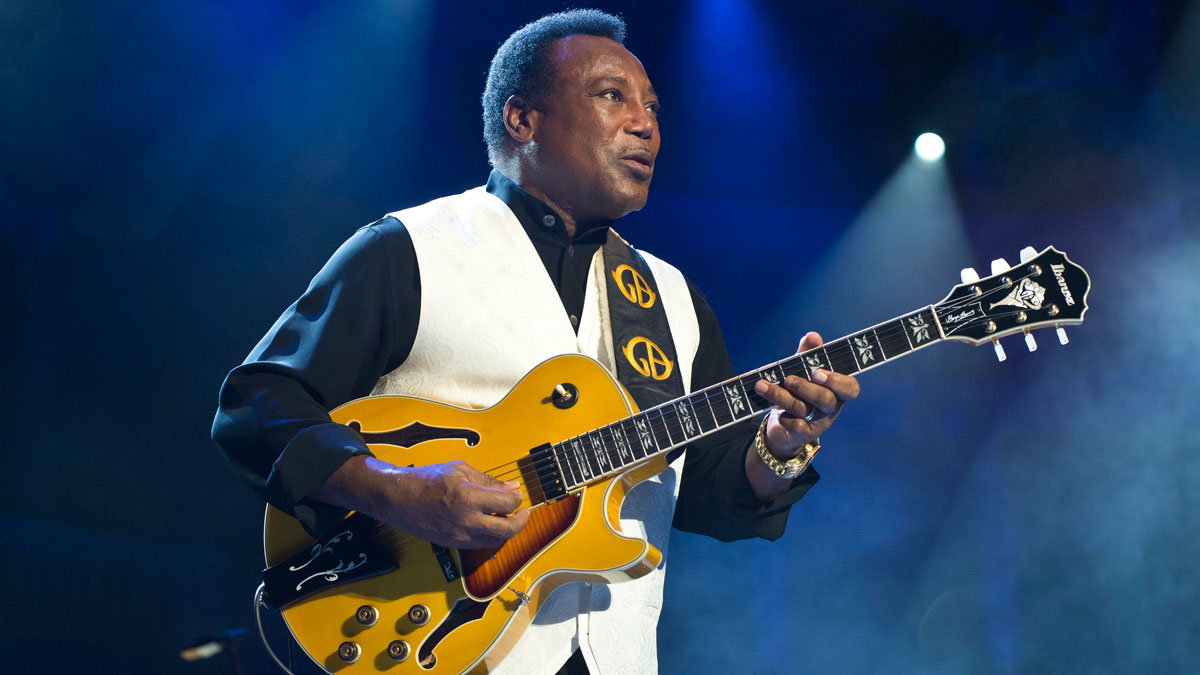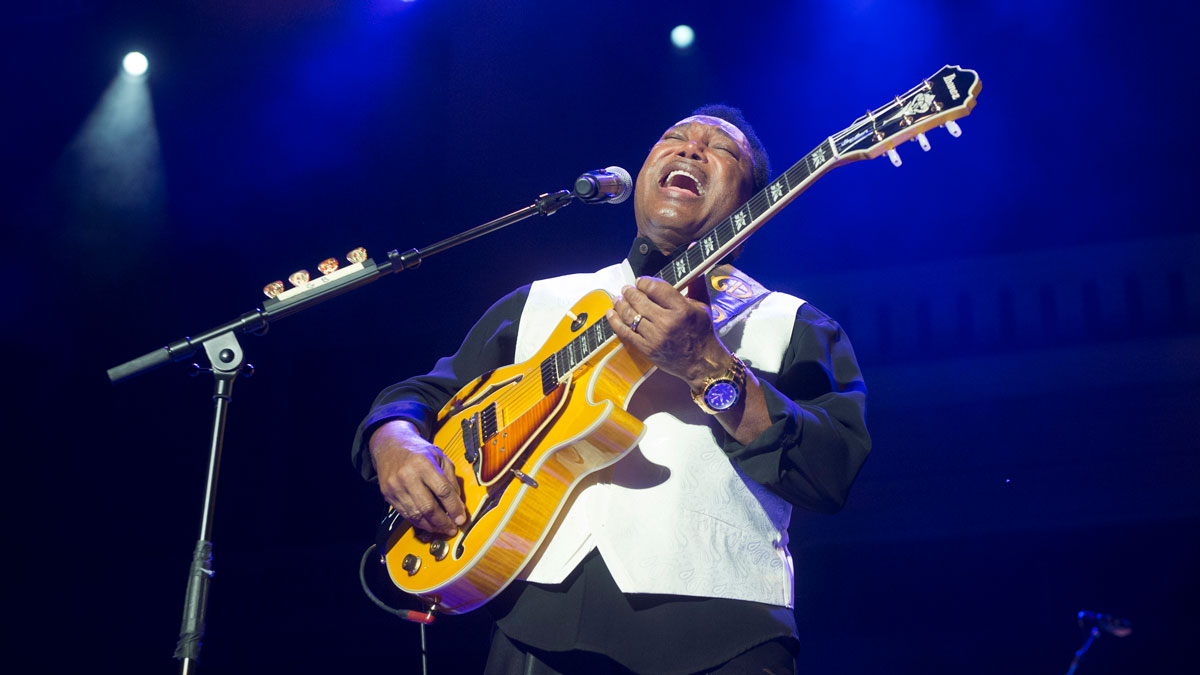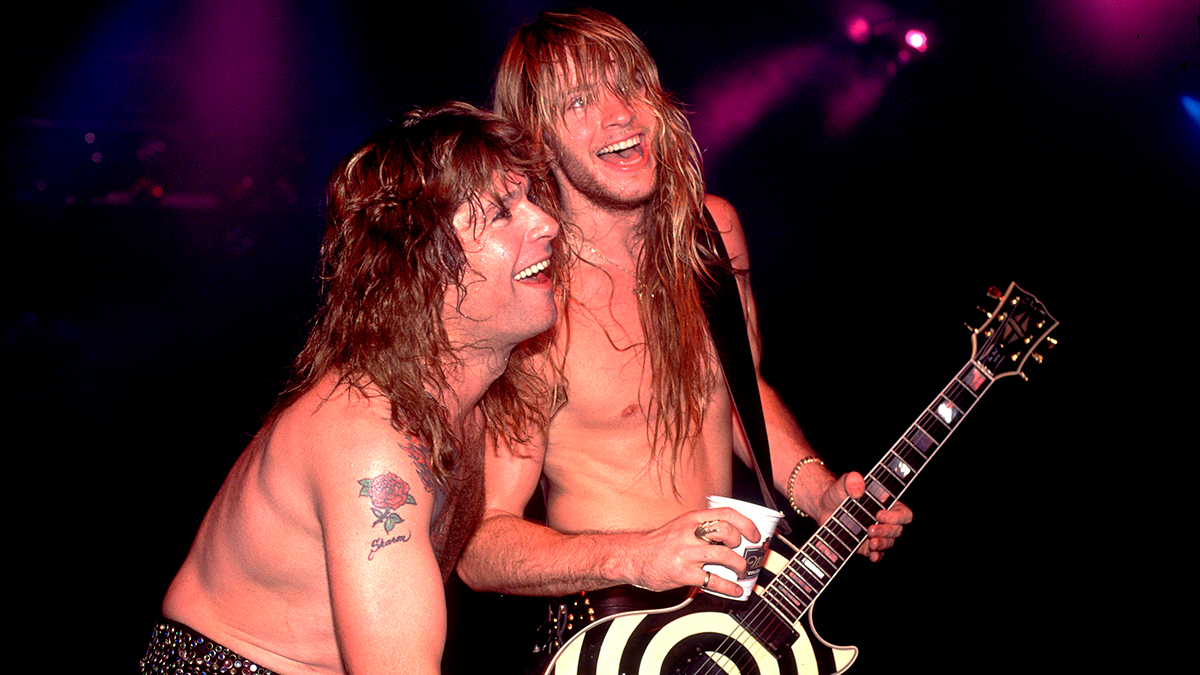George Benson on the time he met Jimi Hendrix, how Peter Frampton changed the course of his career and what Paul McCartney made of his Beatles tribute

George Benson really wants to talk about the new album he’s cutting. It’s his first studio recording since 2019’s Walking to New Orleans, and as he says, “It’s going to be something really special.”
He starts to divulge a detail or two, then abruptly stops. “Well, that’s about all I can say right now,” he says. When pressed for any kinds of tidbits, he laughs and relents every so slightly. “I can't let out exactly what it is, but it's something different from anything I’ve ever done, and I’m working one of the top arrangers of our time. That's about as far as I can go with that. I’m keeping it under my hat for now.”
In actual fact, musically speaking, there isn’t much that the 80-year-old guitar legend hasn’t done. After cutting his teeth in organist “Brother” Jack McDuff’s jazz band in the early ‘60s, Benson struck out on his own and released The New Boss Guitar of George Benson. From there, he never looked back.
His virtuosic chops and artful sense of style, combined with an unshakable taste for adventure, quickly established him as one of the most exciting and original jazz guitarists since Charlie Christian. But Benson – also blessed with a smooth and soulful tenor singing voice – wouldn’t limit his gifts to the strictly jazz market, and over the years he spanned pop, rock, R&B, disco, blues and Latin music (his 1976 crossover smash, Breezin’, hit number one on Billboard’s Top 200 and bagged him a pair of Grammys).
“Anytime somebody says, ‘What’s George doing playing this kind of music?’ I want to say, ‘Well, why shouldn’t I?’” Benson says. “I like to challenge myself.” It would seem that he’s never at a loss for new avenues to explore – just last year, he contributed velvety solos on funk master Bootsy Collins’ groove slammer The Power of One.
Speaking of his 2018 collaboration with the virtual band Gorillaz on their trippy single Humility, Benson says, “When I heard their name, I said, ‘Gorillaz? I don’t know, man.’ Then I found out they were a rock group or a pop group from London, and I said, ‘Well, let me hear what they’ve got.’ At first, I didn’t know what to do, but I hate to disappoint people. Finally, I told the engineer, ‘Tell you what – put me in the middle of that band. Turn the big speakers on like I'm in a live situation.’ When he did that, I knew what to play.”
As he enters his ninth decade, Benson reveals that the guitar still holds the same allure as when he began playing. “I’ve never gotten tired of the sound of the instrument,” he says. “It’s such an incredible thing – the relationship of wood and strings, how you can create tones and project a vibe. The guitar speaks to me. When I play a note, I can shape the sound. I can make it thin, skinny and harsh, or I can warm it up and make it sound very enticing and romantic.”
A longtime resident of Englewood, New Jersey, Benson kicks off his summer tour in the Garden State with a concert at the NJPAC in Newark on June 2.
All the latest guitar news, interviews, lessons, reviews, deals and more, direct to your inbox!
“I’ve always loved playing for Jersey crowds,” he says. “I remember coming over to New Jersey a long time ago, back when I was in Jack McDuff's band, when I was 19 or 20 years old. I played at the local clubs; it was a learning ground for me. It taught me what people like and what they don’t like.” He laughs. “So I got rid of all of the bad stuff and kept the good stuff.”
You started making records at the age of nine. Did you know back then that you had a gift?
“People told me that all my life, but I didn't know what it meant. I just knew that music was important to me. I liked the feeling it gave me. My mother was a singer. I learned the classics from her because she was always humming along to something. I thought I was quite ordinary, in fact. I thought everybody was ordinary. [Laughs]”
Among your influences was Hank Garland, who wasn’t jazz per se – he played on a lot of country and rock ‘n’ roll hits. What was it about his playing that you tried to absorb?
“Power. His command of the guitar. Everything was so deliberate, and he had so much energy. He had that country thing in that he sounded very honest and straight ahead. There was no hesitation in how he played. He was very, very powerful. He also had great command of harmony and theory. His chord progressions were straight ahead but still very effective.”
I’m curious – during the ‘60s, did any of the big rock guitarists make a dramatic impact on you?
They said, ‘Man, George Benson wouldn't even let Hendrix sit in and play.’ And Ronnie Isley said, ‘It's a good thing, because nobody can beat George Benson on the guitar’
“There’s a few from that era. Eric Clapton was one, and Jimi Hendrix was another one. There were others, but those two guys were very influential back then. People were like, ‘Hey man, have you heard what Clapton is playing?’ I said, ‘Who?’ ‘Clapton, man.’ So pretty soon it became something you had to do. You had to find out what he was doing, and then you find out what he was doing was important.”
Did you ever meet Hendrix?
“Of course. I met Hendrix before his career blew up. Everything I heard him play was special. He came by to see us one night when I was playing in Harlem, down the street from James Brown at the Apollo Theater. He was playing with the Isley Brothers at the time. They told the story about that night a few years later in an article. They said, ‘Man, George Benson wouldn't even let Hendrix sit in and play.’ And Ronnie Isley said, ‘It's a good thing, because nobody can beat George Benson on the guitar.’ [Laughs]”
This was before you hooked up with Ibanez. Back then, you favored Guild guitars.
“I was using mostly Guild guitars. These two brothers owned the company, and one of them said, ‘Man, I heard a young guy play guitar the other night. He is spectacular. You’ve got to sign him up.’ So they did. They signed me up and they gave me several guitars – beautiful instruments. I was with them for a few years until I ran into Ibanez.
“By that time I had soured my deal with Guild because they saw me playing another guitar and they got incensed by it. They wouldn't even talk to me after that. I couldn't get anybody on the phone anymore – until Breezin' came out and Ibanez hooked me up. Then they started calling me.”
Miles Davis tapped you to play on his album Miles in the Sky. What was he like? Was he tough?
“[Laughs] Everything you heard about him is true – all of the crazy things, the quirks and all that. He did one interview in his whole career. One. He signed one autograph that I know of. One. Different kind of guy.”
I take it he was intimidating in the studio.
“Yes, somewhat. I didn't do anything to make to get him off of the center, but I knew a lot of people who did and they didn't like the result. I stayed away from all of that. We were actually friends. I used to see him places, and he always acknowledged me and we had good conversations. I think he was trying to get me to join his band at the time I did the album with him. My manager said, ‘You can't do that.’”
Did Miles direct you how he wanted you to play?
“That's what made him great – he didn’t do that. When I was doing the record with Miles, [drummer] Tony Williams tried to tell me what to play, and Miles said to him, ‘Tony, play your drums, man. Stop telling George what to play. And on second thought, take your drums and set up in the corner out there. You’re too loud.’ He put Tony way in the corner of the studio. [Laughs]”

The legendary A&R man John Hammond signed you to Columbia Records. I imagine that you two had some great musical discussions.
“All the time. He was probably the greatest A&R man I've ever met – I think in history, to tell you the truth – because he didn't try to tell you what to play. He just said, ‘Play it. Let’s hear what you’ve got. Play it.’ If he heard two bars that he liked, he said, ‘I’m turning the recording button on now.’
“I used to go up to his office on Sixth Avenue and sit with him. He told me all these wonderful stories about the people he discovered – Billie Holiday, Charlie Christian, Count Basie.”
John had an ear for brilliant singers and songwriters, but he also loved guitarists. He signed Stevie Ray Vaughan and, as you mentioned, Charlie Christian.
“He told me about Charlie Christie. Somebody told John, ‘The greatest guitar player in this country is up in Oklahoma City.’ So he jumped in his car and hopped over to Oklahoma City until he caught up with Charlie Christian, who was playing with his brother on bass. John loved Charlie and tried to get him to leave the band to come to L.A. with him. Charlie refused – ‘I ain't going nowhere without my brother.’
“Well, John stayed there a few days, took Charlie shopping, and finally he convinced him to go to L.A. John went to see Benny Goodman and said, ‘Man, this kid is the baddest cat in the world on guitar.’ And Goodman said, ‘It doesn't make any difference. I cannot put another African-American in my band. I'm having problems booking the band now in the South.’
“So one night John snuck Charlie Christian into the band. He snuck a stool and an amp onto the bandstand when Benny Goodman was taking a break. Benny came back and saw Charlie on his bandstand. Rather than make a fuss, he called out for Rosetta and pointed out the solos – ‘Horns, all right, now guitar!’ Charlie started playing and everybody jumped out of their seat – they never heard anything like that. They ran over to the bandstand and they wouldn't let him stop playing. That's how he got into Benny Goodman's band.”
That’s a great story. I’ve always loved your tribute to the Beatles, The Other Side of Abbey Road. Did any of Fab Four comment to you about it?
“All the time. When that record came out, the industry hated it. All the jazz people hated that. But Paul McCartney sent word back to me – ‘Man, we love what you did with our music.’ That was great compensation. I knew that the album would mean something one day.”
A few years later, your album Breezin’ hit number one. What on earth did you think at the time?
Frank Sinatra asked me to sit beside him, and he said, ‘George, your guitar playing, we all know what that is, man. You're fantastic. But I love your voice’
“That it was impossible! [Laughs] I’ll tell you, the guy who probably helped me get there was Peter Frampton. Remember, he had the biggest record ever at the time; he was dominating the covers of magazines. He was the one you had to defeat in order to get the cover of Record World and all those magazines. But he said something in an article that really spurred me on. He said, ‘I listen to George Benson records all the time.’
“I was like, ‘What? You mean this genius, this kid selling all these records, listens to my music? I don't sell no records!’ [Laughs] But that's what he said. So I said, ‘Let me listen to his records and see what he's doing that makes his music so outstanding.’ I started listening to his music, and I thought, ‘OK, he’s got percussion over here, and he’s got that going on. Let me try some of that.’”
You became something of a pop star. You also did some disco tunes. Did you get flak from any of your early jazz fans?
“Always. But one thing I understand about this world, if you go left, they'll say, ‘You should have gone right,’ and vice-versa. That's common stuff, and it happened to a lot of my friends. It broke Wes Montgomery's heart when he went home to play in Indianapolis. He was a star by then, and he was playing at a local arena downtown. Every time he played a pop tune, his older fans would boo. Then he would play the jazz tunes and they would go crazy. He was caught in the middle of all of that. I understand how that works.
“The greatest thing that happened to me in that regard was when I did a record with Frank Sinatra. He asked me to sit beside him, and he said, ‘George, your guitar playing, we all know what that is, man. You're fantastic. But I love your voice.’ After he said that, I couldn’t listen to people talk about my vocals anymore. I didn’t even hear them.”
Speaking of vocals, what about scatting? Many listeners never heard you do that until you came out with On Broadway and This Masquerade. How does scatting inform your phrasing on the guitar?
“It’s all the same brain. They both have their physical limitations. When one cannot do a certain thing, the other one can. It took me years to figure. When I was a kid, I’d listen to Charlie Parker’s Just Friends. His solo – I couldn’t play it, but I could sing every note.
“When I started doing that on my records, I found that was easy. Of course, what I was doing was lightweight compared to Charlie Parker, but I did like improvising.”
How many signature models have you had with Ibanez?
“I think we’ve got about 15 signature guitars, maybe more. What I really like is that they offer refinements for guitar collectors and people who are trying to find something different to play. It gives them options, and every now and then they'll come up with a gem like the GB10, something very special that you’ve got to have in your collection.”
You’ve been with the company for over 40 years. Is there some sort of refinement on any of the guitars you haven’t done yet?
“No, I'm taking information from people who play guitar. The new up-and coming people are still giving me information. The company takes that information to make the best guitars they can.”
Joe is a freelance journalist who has, over the past few decades, interviewed hundreds of guitarists for Guitar World, Guitar Player, MusicRadar and Classic Rock. He is also a former editor of Guitar World, contributing writer for Guitar Aficionado and VP of A&R for Island Records. He’s an enthusiastic guitarist, but he’s nowhere near the likes of the people he interviews. Surprisingly, his skills are more suited to the drums. If you need a drummer for your Beatles tribute band, look him up.

